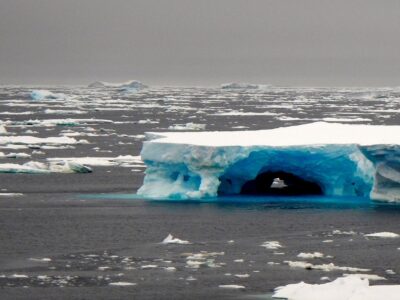
After rapidly scaling up in strength, Hurricane Harvey has dumped an ‘unprecedented’ amount of rainfall onto Houston, Texas. Lives have been lost, homes flooded, and officials estimate the damages may make this one of the costliest natural disasters in U.S. history.
But inevitably, Americans want to know just how ‘natural’ this disaster really was, and what role climate change may have played. This video from Columbia’s International Research Institute for Climate and Society and Lamont-Doherty Earth Observatory helps to break it down:
Climate scientists are fairly certain that climate change will, on average, make hurricanes stronger. “We know the atmosphere is getting warmer, and the oceans are getting warmer,” Chia-Ying Lee, who studies tropical cyclones at the International Research Institute for Climate and Society, explained to State of the Planet.
Hurricanes are driven by ocean heat, and some scientists have pointed out that the Gulf of Mexico was warmer than average this year. Hurricane Harvey rapidly transformed from a tropical storm to a Category 4 behemoth as it sucked energy off those particularly warm waters. Making matters worse, warmer air is able to hold more water, and more water vapor can lead to more rain, so scientists expect that a warming world will have more heavy downpours.
For now, that’s about all that anyone can say with much certainty. It sure seems as if climate change contributed to Hurricane Harvey, but it’s not certain yet, and if it did, scientists would want to know by how much? “It’s just very hard to say much without more study,” says Lee.
Climate scientists will never be able to say that climate change “caused” a particular extreme weather event. A popular analogy is a baseball player on steroids: we know doping makes the player stronger, but we can’t say for sure whether any particular home run was the result of the steroids. What climate scientists can do is calculate the likelihood that climate change made an extreme weather event stronger.
So how are those studies done?
Weather is constantly fluctuating, influenced by a variety of factors, and this can create a lot of noise in the data that climate scientists work with. But by carefully analyzing the statistics, they can start to pull out trends that can’t be explained by regular day-to-day weather changes.
Climate scientists have a few ways of determining whether Harvey bears the fingerprints of climate change. One way is to ask what would happen if this particular event had occurred in a climate without human-induced warming, says Lee. For that, investigators use regional models to simulate the storm (or other extreme weather event). By plugging in different climate conditions, they can see how the storm behaves both with and without climate change. Comparing the two scenarios shows just how much climate change impacted the storm. If there’s no difference, then probably climate change didn’t play a major role. However, if the storm is stronger under the conditions of climate change, then scientists can estimate that today’s warmer climate strengthened the storm by some particular percentage. Or they can estimate how the storm would behave in 2100, when the world is expected to have heated up by another two to six degrees Celsius.
These simulations, of course, depend on the accuracy of the models, so in general it’s best to run them on multiple climate models, which can take time. And hurricanes can be particularly difficult to study in this regard, because they’re relatively short-lived. Still, Lee estimates that within a year or less, scientists will have a clearer idea of how much climate change contributed to some of Harvey’s behavior.
“In the case of Harvey, as with other specific events, scientists now have the capability to perform attribution studies which make more quantitative statements about how greenhouse gas emissions influenced that event,” Suzana Camargo and Adam Sobel from Columbia’s Lamont-Doherty Earth Observatory wrote in a Fortune op-ed this week. And although it’s reasonable to expect those studies will find that climate change amplified Harvey’s rainfall by a modest amount, they write, “We should not make detailed statements presupposing their outcomes before those studies are done.”
Editor’s Note: This post was updated with a video on September 5, 2017.



